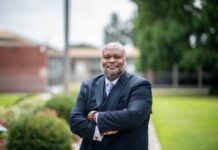The media reported a high turnout for recent presidential elections in Afghanistan. According to the New York Times, so many voters showed up that some polling stations were running out of ballots and some were extending hours for voting. All this happened despite threats of violence made by the Taliban against Afghan citizens who chose to exercise their franchise.
The media reported a high turnout for recent presidential elections in Afghanistan. According to the New York Times, so many voters showed up that some polling stations were running out of ballots and some were extending hours for voting. All this happened despite threats of violence made by the Taliban against Afghan citizens who chose to exercise their franchise.
For most of us in the United States, elections are months away, but it is not too early to talk about voting. Why is it that in Afghanistan, where the opportunity to cast a ballot is relatively new, citizens are willing to risk their lives to vote, while here in America, where we claim to offer a shining example of democracy to the rest of the world, our voter turnout is embarrassingly meager.
The Wikipedia page on voter turnout pegs the American electorate's participation act a mere 48 percent between 1960 and 1995 (averaging the 55 percent during presidential election years and a 40 percent non-presidential). That means that on average not even half of those eligible are casting a vote and making their voice heard. That also puts us far behind voter participation in Estonia, Pakistan, Bulgaria, Romania, the Czech Republic and Slovakia, Hungary, Venezuela, and a couple dozen other countries.
This is baffling and frustrating. We have a reasonably educated populace and plenty of divergent opinion on how the role of government and how it's affairs should be conducted. Yet we seem to be a people who are content to, at best, not pay attention, and, at worst, ignore our opportunity to participate in the process of electing representatives.
Ultimately, this gives us exactly the government we deserve — the one we have chosen to not choose. For all of our complaining about not being well-represented in Washington D.C., the state legislature, or other entities, we have no one to blame but ourselves if we are not voting.
In other words, if we as a society do not make voting a cultural priority, we should expect the decisions made by our elected leaders will reflect not a general consensus of population, but the will of the narrower segment that made its preferences heard on Election Day.
One meme making the Internet rounds states that politicians we disagree with are not elected solely by their supporters; rather, they are ushered into office also by those who do not support them, but do not make the time to cast a ballot.
Of course, certain factions are making it more difficult to vote. Despite any assertions about the very rare crime of voter fraud, make no mistake: these changes in voting laws are exclusively about reducing the likelihood that the poor (meaning “less politically powerful”) will have a voice in the lawmaking process.
Shame on those who would disenfranchise voters with whom they disagree. And shame on us if we do not make voting a cultural priority. If we do not, we will suffer an increasing disparity between what our nation needs and what our nation gets.
Pat Grimes, a former South Bay resident, writes from Ypsilanti, Mich. He can be reached at pgwriter@inbox.com.



















